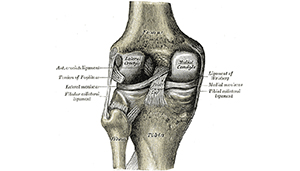
[Image by Henry Vandyke Carter – Henry Gray (1918) Anatomy of the Human Body, Public Domain]
The results matter because experts assumed that BMI plays a role when it came to the roughly 15% of meniscal repairs that fail, said Dr. David Flanigan, an orthopedic surgeon at Ohio State Wexner Medical Center who was the lead author of the study.
“This tells us that surgeons should not consider weight as a factor when deciding if a patient is a good candidate for meniscal repair surgery,” Flanigan said in a news release. “If a meniscus is repairable and surgery is appropriate for that patient, you can do the surgery and they would have the same success as someone who is not as heavy.”
Flanigan and his colleagues published their study in The Journal of Knee Surgery. The OSU researchers followed 410 people who underwent meniscal repair surgery from 2006 to 2012 and found no significant difference in failure rates between those with a normal BMI (less than 25) and elevated BMI (25 or higher).
There is an important caveat to consider with this study. Among the 410 people covered in the study, 90% had a BMI of less than 35. It’s unclear, then, whether severe obesity could play a role in meniscal repair failure. Still, those who are simply on the heavier side shouldn’t see a difference when it comes to whether the repair sticks.
Surgeons have factored in weight along with other factors including activity level, type of meniscus tear and stability of the knee when judging whether a meniscal repair will fail. If they think that it will, they may opt to instead perform a meniscectomy, in which they remove part or all of the meniscus. A meniscectomy can potentially lead to knee instability and joint degradation.
Flanigan said his research shows that it best to repair the meniscus whenever possible, versus removing it.
“That structure is so vital to the knee and provides a cushion to the joint,” Flanigan said. “Repairing it can prevent some of the arthritic changes from progressing in the knee. So if a meniscus is repairable, I’m very aggressive to perform that procedure.”
[Want to stay more on top of MDO content? Subscribe to our weekly e-newsletter.]




